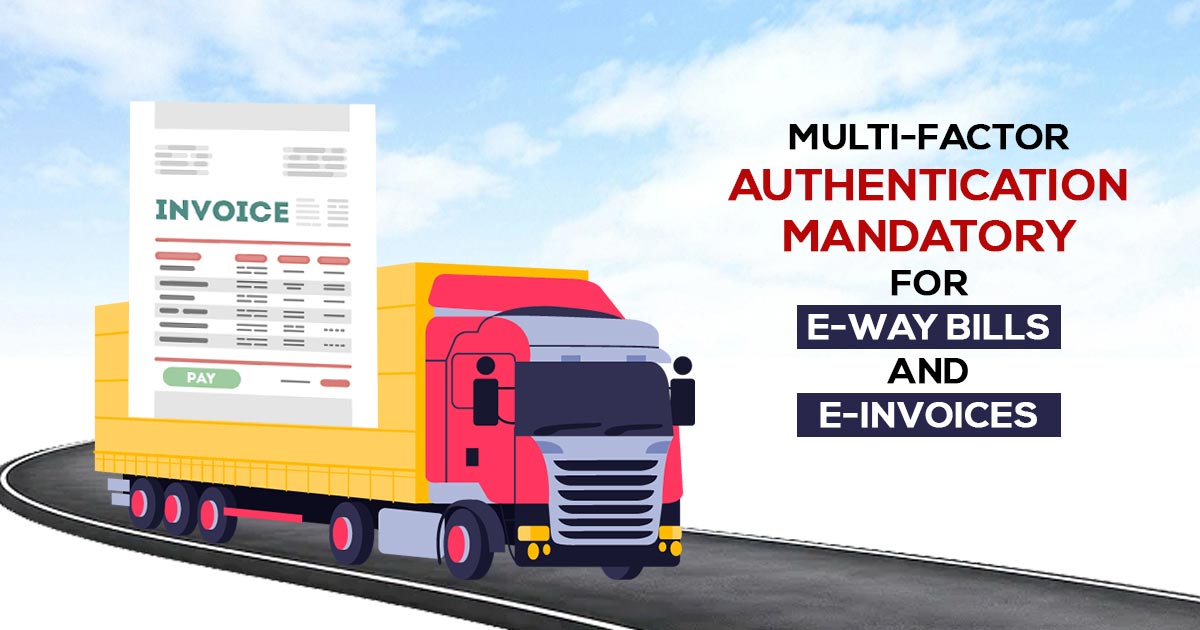
For all the taxpayers Multi-Factor Authentication (MFA) for using the updated versions of the E-Way Bill and E-Invoice Systems will be obligatory from April 1 next year, as per the GST portal advisory. There will be an updated provision for limiting the e-way bill generation.
MFA starting January 1, 2025, will become obligatory for the assesses with AATO (Aggregate Annual Turnover) surpassing Rs 20 crore, from February 1, 2025, for those with AATO surpassing Rs 5 crore and from April 1, 2025, for all other assessees and users, as per the advisory.
For all the assessees MFA is obligatory with an AATO surpassing Rs 100 crore as of August 20 last year and optional for those with Rs crore surpassing AATO since September 11, 2023.
As the National Information Centre (NIC) these amendments will be made and will roll out the updated versions of the e-way bill and e-invoice systems w.e.f 1st January 2025. As per the advisory, “These updates are aimed at enhancing the security of the portals, in line with best practices and government guidelines.”
A person is needed to hold an e-way bill document in charge of the conveyance holding any consignment of goods surpassing Rs 50000. The same gets generated from the GST common portal for the e-way bill system by registered persons or transporters who drive the goods movement of consignment before the start of these movements.
According to Rule 48(4) of CGST Rules, the reported class of registered individuals would required to make an invoice by uploading the invoice particulars (in FORM GST INV-01) on the Invoice Registration Portal (IRP) and get an Invoice Reference Number (IRN). Post complying with the aforesaid e-invoicing procedure, the invoice copy having inter alia the IRN (with QR code) furnished via the notified supplier before the buyer is directed to as e-invoice in GST.
‘E-invoice’ in ‘e-invoicing does not refer to the generation of the invoice via a government portal. The invoice not enrolled on the portal shall be invalid. Input tax credit for the case on the same could not claimed via the receiver and shall draw the penalties. As of August 1, 2023, e-invoice is obligatory for taxpayers with AATO of Rs 5 crore.
E-Way Bill Updated Regulations
According to the advisory, the generation of the e-way bill will be limited to the documents dated 180 days from the generation date. For example, the documents dated before July 5, 2024, will not qualify for the generation of e-way bill starting January 1, 2025. Also, the extension of e-way bills will be restricted to 360 days from their original document date. For instance, an E-Way Bill can only be extended up to December 25, 2025.
“Taxpayers are requested to familiarize themselves with these updates and incorporate the necessary adjustments into their compliance processes,” the advisory mentioned.
Tax experts remarking on the report mentioned the limitations on the E-Way Bill (EWB) generation and extension, which mark a significant step for improving compliance and clarity in the movement of goods.
Restricting the EWBs generation to 180 days from the date of the base document and capping extensions to 360 days will be significant in curtailing malpractices. Such measures will address the misuse of backdating and forward dating of the transactions which are frequently exploited for tax evasion, inventory misrepresentation, or late GST payments.